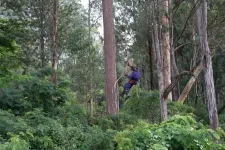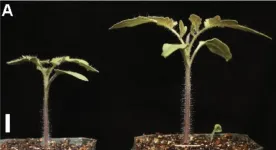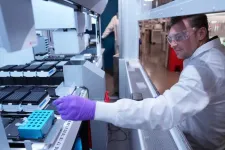(Press-News.org) CABI joined an international team of researchers from 57 institutions around the world to share its expertise in a ground-breaking study which highlights the urgent need to protect the world’s forests from non-native pests amid climate change.
The study, led by Dr Iva Franić* – who at the time of the research was a PhD student co-supervised by CABI’s Dr René Eschen – stresses an urgent need to limit tree pests and enhance the resilience of forest ecosystems in the face of rising temperatures.
Published in the journal Scientific Reports, the scientists – that also included CABI’s Dr Marc Kenis and Dr Hongmei Li – argue that by understanding the intricate relationships between climate, host species, and geography, stakeholders can develop strategies to protect the world’s forests and the invaluable benefits they provide.
The study involved an extensive survey of insects and fungi associated with dormant twigs of 155 tree species at 51 botanical gardens or arboreta in 32 countries across six continents. The researchers determined the relative importance of various factors in driving differences in tree-associated communities.
The results indicated that mean annual temperature, phylogenetic distance between hosts, and geographic distance between locations were the primary drivers of dissimilarities.
Of particular concern was the increasing significance of high temperatures on the differences observed in the studied communities, suggesting that climate change could directly and indirectly impact tree-associated organisms through shifts in host ranges.
The researchers also found that insect and fungal communities exhibited greater similarity when associated with closely related host species, implying that host range shifts might facilitate the emergence of new pests.
Additionally, dissimilarities among tree-associated communities increased with geographic distance, implying that human-mediated transport could facilitate the introduction of new pests into a forest.
Dr Franić, who now works at Swiss Federal Institute for Forest, Snow and Landscape Research WSL said, “The study's findings demonstrated that climatic factors played a crucial role in shaping the composition of fungi, particularly saprotrophic and plant pathogenic fungi, as well as herbivorous insects associated with trees.
“Moreover, the study highlighted the importance of host-related factors, such as phylogenetic distance and wood density, in shaping these communities. Closely related host species were found to share more species of insects and fungi, suggesting a co-evolutionary relationship.”
The scientists suggest that geographic factors also played a significant role, with the distance between locations emerging as a critical driver of diversity. The study found distinct geographic structure within continents for both plant pathogenic fungi and herbivorous insects, indicating limited dispersal between locations. However, the exchange of plant material across continents could lead to the introduction of new pests and pathogens.
Dr Eschen, a co-author of the research, said, “The findings of this study provide valuable insights into the complex dynamics of tree-associated communities and emphasize the importance of proactive measures to safeguard forest health in the face of environmental challenges.
“As climate change and global trade continue to shape our world, understanding and predicting these changes will be crucial for the long-term sustainability of our forests.”
The scientists conclude by stressing that safeguarding tree-derived environmental and societal benefits will, therefore, depend on limiting the establishment of new forest pests and increasing the resilience of trees and forest ecosystems to climate change.
Full paper reference
Iva Franić, Eric Allan, Simone Prospero, Kalev Adamson, Fabio Attorre, Marie Anne Auger-Rozenberg, Sylvie Augustin, Dimitrios Avtzis, Wim Baert, Marek Barta, Kenneth Bauters, Amani Bellahirech, Piotr Boroń, Helena Bragança, Tereza Brestovanská, May Bente Brurberg, Treena Burges, Daiva Burokienė, Michelle Cleary, Juan Corley, David R Coyle, György Csóka, Karel Černý, Kateryna Davydenko, Maarten de Groot, Julio Javier Diez, H. Tuğba Doğmuş Lehtijärvi, Rein Drenkhan, Jacqueline Edwards, Mohammed Elsafy, Csaba Béla Eötvös, Roman Falko, Jianting Fan, Nina Feddern, Ágnes Fürjes-Mikó, Martin M. Gossner, Bartłomiej Grad, Martin Hartmann, Ludmila Havrdova, Miriam Kádasi Horáková, Markéta Hrabětová, Mathias Just Justesen, Magdalena Kacprzyk, Marc Kenis, Natalia Kirichenko, Marta Kovač, Volodymyr Kramarets, Nikola Lacković, Maria Victoria Lantschner, Jelena Lazarević, Marianna Leskiv, Hongmei Li, Corrie Lynne Madsen, Chris Malumphy, Dinka Matošević, Iryna Matsiakh, Tom W. May, Johan Meffert, Duccio Migliorini, Christo Nikolov, Richard O’Hanlon, Funda Oskay, Trudy Paap, Taras Parpan, Barbara Piškur, Hans Peter Ravn, John Richard, Anne Ronse, Alain Roques, Beat Ruffner, Alberto Santini, Karolis Sivickis, Carolina Soliani, Venche Talgø, Maria Tomoshevich, Anne Uimari, Michael Ulyshen, Anna Maria Vettraino, Caterina Villari, Yongjun Wang, Johanna Witzell, Milica Zlatković, René Eschen, ‘Climate, host and geography shape insect and fungal communities of trees,’ Scientific Reports, 18 July 2023, DOI: 10.1038/s41598-023-36795-w
The paper can be read open access here: https://doi.org/10.1038/s41598-023-36795-w.
Data set notes
The data set this paper is based on was published in March 2022 here: https://www.nature.com/articles/s41597-022-01162-3
Dr Franić’s PhD research
*The latest paper stems from work Dr Franić previously conducted as part of her PhD studies co-supervised by Dr Eschen.
In 2020, she obtained her PhD degree from the University of Bern in Switzerland, for her thesis entitled ‘The diversity of insects and fungi associated with trees: A plant health perspective.’
The research, which was led by CABI and the Federal Institute for Forest, Snow and Landscape Research (WSL) in Switzerland and funded by the Swiss National Science Foundation and related to COST Action Global Warning, assessed phytophagous insects and fungi in tree seeds purchased from commercial suppliers and fungi in tree seeds collected in botanic gardens in Europe and the USA.
The team also considered fungi and insects in dormant twigs from 32 countries to assess the diversity of such organisms and factors that may facilitate their establishment in other countries.
END
Study highlights urgent need to protect world’s forests from non-native pests in the face of climate change
CABI joined an international team of researchers from 57 institutions around the world to share its expertise in a ground-breaking study which highlights the urgent need to protect the world’s forests from non-native pests amid climate change.
2023-07-18
ELSE PRESS RELEASES FROM THIS DATE:
Walking the moral tightrope:
2023-07-18
During his presidency, Donald Trump and members of his administration repeatedly accused federal civil servants of undermining their agenda through the “deep state.” They sought to curtail career employees’ workplace protections, sought to severely cut some agencies’ funding, and in some cases attempted to undermine or alter agency missions.
Hamilton College Associate Professor of Sociology Jaime Kucinskas and Yvonne Zylan, an independent scholar, published the peer-reviewed “Walking the Moral Tightrope: Federal Civil ...
Ethylene boosts plant yield and vigor
2023-07-18
Exposing seedlings to ethylene in darkness increases size and vigor, in a finding with implications for agriculture. Farmers have worked to increase crop yields for millennia, and the quest remains urgent as the human population continues to grow. Increases in yield often come at a price, however: reductions in stress tolerance. Brad Binder and colleagues sought to increase plant yield without sacrificing hardiness by using to the gaseous plant growth hormone ethylene. Previous work established that seedlings grown in the dark and treated with ethylene show reduced growth and a distinctive hooked shape. However, the authors found that ...
Each mom passes unique set of breast milk antibodies to baby
2023-07-18
Breast milk from each individual contains a unique assemblage of antibodies that are surprisingly stable throughout lactation and across pregnancies, according to a new Journal of Experimental Medicine study from the University of Pittsburgh School of Medicine.
As a baby’s early immunity is directed by antibodies from breast milk, the new research provides insight into why protection against different infections varies among infants and why some develop a life-threatening gut disease called necrotizing enterocolitis (NEC).
“While each milk donor in our study had very different antibody profiles from one another, we ...
Life on Earth didn’t arise as described in textbooks
2023-07-18
Life on Earth didn’t arise as described in textbooks
No, oxygen didn’t catalyze the swift blossoming of Earth’s first multicellular organisms. The result defies a 70-year-old assumption about what caused an explosion of oceanic fauna hundreds of millions of years ago.
Between 685 and 800 million years ago, multicellular organisms began to appear in all of Earth's oceans during what's known as the Avalon explosion, a forerunner era of the more famed Cambrian explosion. During this era, sea sponges and other bizarre multicellular organisms replaced small single-celled ...
This is what relatives think about home-based hospital care
2023-07-18
Relatives are a great resource in today's healthcare system. In Norway, relatives' efforts add up to approximately the same number of person-years as provided by the public municipal health and care services.
But the role of relatives is changing. Changes in the age composition of the population, changed social structures and family patterns will affect how many relatives each of us has to support us in the future.
In order to look after relatives in the best possible way, it is necessary to have increased knowledge about relatives' involvement and the need for support in various ...
Howard and Susan Elias make $16.25 million gift to fund cancer neuroscience research at MD Anderson
2023-07-18
HOUSTON ― The University of Texas MD Anderson Cancer Center today announced a
$16.25 million gift from Howard and Susan Elias to accelerate brain tumor and cancer neuroscience research, an emerging field focused on integrating the role of the nervous system in cancer. Howard Elias’ son, Harrison, was diagnosed with brain cancer and underwent successful surgery in 2000. Six years earlier, Howard’s father had died of glioblastoma. These separate diagnoses sparked a giving program over the years, leading to this latest gift which represents ...
Allen Institute for Immunology partners with Lilly to better understand autoimmune disease
2023-07-18
SEATTLE — July 18, 2023 — In a significant milestone for the Allen Institute for Immunology, a division of the Allen Institute, researchers and staff will collaborate with private industry researchers to aid in the detailed molecular understanding of disease, in service of developing new treatments and therapies to improve human health.
Specifically, Allen Institute scientists will work with researchers from Eli Lilly and Company (Lilly) to investigate and profile disease state diversity and biomarkers for drug response involving atopic dermatitis (eczema) and rheumatoid arthritis using Allen Institute-developed ...
Using AI to speed up vaccine development against Disease X
2023-07-18
CEPI, the Coalition for Epidemic Preparedness Innovations, and the Houston Methodist Research Institute (HMRI), have today announced a partnership to combine cutting-edge artificial intelligence (AI) technology with established laboratory techniques to speed up development of future vaccines against novel viral threats (also known as Disease X). HMRI will lead a consortium including experts from Argonne National Laboratory (University of Chicago), J Craig Venter Research Institute, La Jolla Institute, The University of Texas Medical Branch, and The University of Texas, ...
Japanese beetles could spread throughout Washington state in 20 years
2023-07-18
PULLMAN, Wash. – Without intervention, the colorful but devastating Japanese beetle could make its way across the evergreen state within two decades, according to a study of their potential dispersion.
The iridescent, green-and-copper beetles damage plants by “skeletonizing” their leaves, chewing up all the soft green parts between the veins. They eat over 300 plants and pose a serious threat to Washington agriculture as some of their favorite crops include grapes, hops and cherries.
Once established, Japanese beetles are tough to eradicate, but it may be possible to keep them under control, said David Crowder, a Washington State University entomologist.
“These ...
Will artificial intelligence (AI) end civilization? Lero researchers seek public's views on AI and software
2023-07-18
Will artificial intelligence (AI) end civilisation? Researchers at Lero, the Science Foundation Ireland Research Centre for Software and University College Cork, are seeking help determining what the public believes and knows about AI and software more generally.
Psychologist Dr Sarah Robinson, a senior postdoctoral researcher with Lero, is asking members of the public to take part in a ten-minute anonymised online survey to establish what peoples’ hopes and fears are for AI and software in general.
“As the experts debate, little attention is given to what the public thinks – and the debate is raging. Some ...
LAST 30 PRESS RELEASES:
How rice plants tell head from toe during early growth
Scientists design solar-responsive biochar that accelerates environmental cleanup
Construction of a localized immune niche via supramolecular hydrogel vaccine to elicit durable and enhanced immunity against infectious diseases
Deep learning-based discovery of tetrahydrocarbazoles as broad-spectrum antitumor agents and click-activated strategy for targeted cancer therapy
DHL-11, a novel prieurianin-type limonoid isolated from Munronia henryi, targeting IMPDH2 to inhibit triple-negative breast cancer
Discovery of SARS-CoV-2 PLpro inhibitors and RIPK1 inhibitors with synergistic antiviral efficacy in a mouse COVID-19 model
Neg-entropy is the true drug target for chronic diseases
Oxygen-boosted dual-section microneedle patch for enhanced drug penetration and improved photodynamic and anti-inflammatory therapy in psoriasis
Early TB treatment reduced deaths from sepsis among people with HIV
Palmitoylation of Tfr1 enhances platelet ferroptosis and liver injury in heat stroke
Structure-guided design of picomolar-level macrocyclic TRPC5 channel inhibitors with antidepressant activity
Therapeutic drug monitoring of biologics in inflammatory bowel disease: An evidence-based multidisciplinary guidelines
New global review reveals integrating finance, technology, and governance is key to equitable climate action
New study reveals cyanobacteria may help spread antibiotic resistance in estuarine ecosystems
Around the world, children’s cooperative behaviors and norms converge toward community-specific norms in middle childhood, Boston College researchers report
How cultural norms shape childhood development
University of Phoenix research finds AI-integrated coursework strengthens student learning and career skills
Next generation genetics technology developed to counter the rise of antibiotic resistance
Ochsner Health hospitals named Best-in-State 2026
A new window into hemodialysis: How optical sensors could make treatment safer
High-dose therapy had lasting benefits for infants with stroke before or soon after birth
‘Energy efficiency’ key to mountain birds adapting to changing environmental conditions
Scientists now know why ovarian cancer spreads so rapidly in the abdomen
USF Health launches nation’s first fully integrated institute for voice, hearing and swallowing care and research
Why rethinking wellness could help students and teachers thrive
Seabirds ingest large quantities of pollutants, some of which have been banned for decades
When Earth’s magnetic field took its time flipping
Americans prefer to screen for cervical cancer in-clinic vs. at home
Rice lab to help develop bioprinted kidneys as part of ARPA-H PRINT program award
Researchers discover ABCA1 protein’s role in releasing molecular brakes on solid tumor immunotherapy
[Press-News.org] Study highlights urgent need to protect world’s forests from non-native pests in the face of climate changeCABI joined an international team of researchers from 57 institutions around the world to share its expertise in a ground-breaking study which highlights the urgent need to protect the world’s forests from non-native pests amid climate change.





